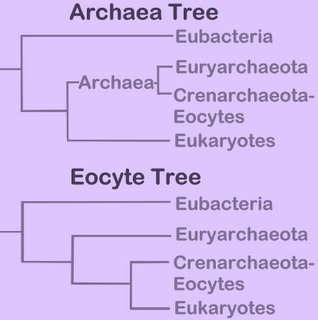Among the Eukarya, protozoa are unicellular organisms, poriferans (sponges) are primitive multicellular (colonial) marine animals with porous bodies supported by a fibrous skeletal framework, while the metazoa comprise 35 phyla of multicellular organisms characterized by tissue differentiation into two layers of cells in the gastrula stage of embryonic development.
The Eukarya comprise one of the three Domains of life (Eubacteria, Archaea, Eukaryota)
1. Nuclear membrane (nuclear envelope, nucleolemma)
2. Membrane bound chloroplasts (plants) or mitochondria (animals and plants)
3. Linear DNA with introns present in most genes (chromosomes)
4. 80s ribosomes
5. Capping and poly-A tailing of mRNA.
6. Transcription factors required
7. Typically multicellular organisms
8. Cells enclosed by plasma membrane with ester-linked phospolipid bilayer
9. Many metabolic pathways of prokaryotes absent in eukaryotes.
Table Comparisons of Eubacteria, Archaea, and Eukaryotes :
 Modern eukaryotic cells appear to have arisen from a prokaryotic cell about 1.4 billion years ago. The Archaea vs Eocyte tree at right shows two current alternative views on the evolutionary relationships of eukaryotes and prokaryotes (click to enlarge).
Modern eukaryotic cells appear to have arisen from a prokaryotic cell about 1.4 billion years ago. The Archaea vs Eocyte tree at right shows two current alternative views on the evolutionary relationships of eukaryotes and prokaryotes (click to enlarge).The Serial Endosymbiotic Theory, first proposed by Lynn Margulis, is widely accepted as explanation for the resemblance between prokaryotic cells and eukaryotic organelles. It is widely accepted that organelles connected to energy transduction are derived from serial endosymbiotic events – mitochondria from purple bacteria, and the chloroplasts of plants from Cyanobacteria.
Table Comparisons of Eubacteria, Archaea, and Eukaryotes :
- The Three Domains View Quicktime Movie - Genetic Data movie of phylogram construction - image cladogram - image Tree of Life— Lateral Gene Transfer Diagram - image uprooted tree - image 16S ribosomal RNA - image The "Shrub of Life" – image A comparison of key characteristics from the three domains of life - enlarged – Evolution and Phylogenetics Animations and Images – Genomics Animations and Images - Proteins & Proteomics Animations and Images – Biodiversity Animations and Images
No comments:
Post a Comment
Note: Only a member of this blog may post a comment.